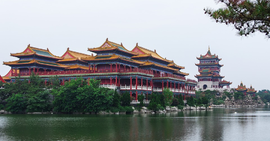Gong Suweiai
| Gong Suweiai | |
| PLN.png | |
| Type | |
|---|---|
| Type |
Public advisory council |
| History | |
| Founded | 1659 AN |
| Structure | |
| Seats |
391 seats |
Political groups |
|
| Elections | |
Voting system |
Members appointed. |
| Meeting place | |
Haigui Palace, Daocheng | |
 |
The Chidao Emperor Imperial Household | Imperial Stewardship Teachings of the Empire
Ministries & Secretariats: Ministry of Truth | Ministry of Purity | Ministry of Stability Chao Suweiai formerly known as National Diet Defunct:
Political Factions: Guanchang | Kantai-ha (Navy) | Gunbatsu (Army) | Shanghu (Traders) Defunct: Other institutions Tianchao Chuandui | Imperial Armed Forces | Young Wandering Society | Tegong |
The Gong Suweiai or Public Council is one of two advisory councils to the Heavenly Light under the Chidao Constitution. The other advisory is the Sifang Suweiai, the Private Council. In contrast to the Sifang Suweiai, the discussions in the Gong Suweiai are open to the public, and the contents of its debates are discussed in newspapers across the Empire. The Gong Suweiai is a spiritual successor to the Imperial Yuan, which was dissolved when the Chidao Emperor abolished democracy in 1659 AN and implemented Jingbuist Absolutism as the state's philosophy.
Members of the Gong Suweaiai are nominated by the Diwang, and approved by the Emperor. The nomination is commonly based on the person's achievements within the Empire's institutions, but also on characteristics like wealth, family ties and ethnic origin. It is customary to have exactly 391 council members at any given time, this reflects the member number of the former Imperial Yuan.
Duties
The Chidao Constitution states that the duty of the Gong Suweiai, together with the Sifang Suweiai is to aid the emperor in his legislative tasks. Matters that are frequently discussed by the Gong Suweiai are:
- Funding of the Empire's institutions
- Funding of military expeditions and other special expenditures
- Codifying the Jingdaoese customs
- Diplomatic relations of a less sensitive nature
- Matters of economy and trade
Chairmans of the Council
| Holder | Tenure | Faction |
|---|---|---|
| Zhong Yin | 1659 - 1660 | Guanchang |
| Yikuang Xan | 1660 - incumbent | Guanchang |
Members of the council
The 391 members of the Gong Suweiai are not elected, but appointed by the Heavenly Light following a nomination by the Diwang, who takes the advise of provincial assemblies, imperial advisers and court officials into consideration. Members are removed from the Gong Suweiai if they display indecent behavior, especially behavior that questions their loyalty towards the Tianchaodao, Jingbuist Absolutism and thus the Heavenly Light. Members that pass away while they serve a term in the Gong Suweiai are immediately replaced by servants from the Imperial Palace until a successor is found. While there is no legal end to a council member's term, it is customary for the Heavenly Light to send all members of the Gong Suweiai every five Norton years. This decision is not announced in advance, but when it happens riot squads from the Tegong will enter the Haigui Palace and sweep it clean, hitting council members with batons if they are not leaving fast enough. Usually the same members are re-appointed a week later. A few members who have delivered sub-standard work are always replaced. Whether they will be replaced with members from the same faction depends from the influence that faction has at the time in the Imperial Court. The custom was introduced by the Chidao Emperor who felt that the Gong Suweiai was starting to get a bit too complacent in the comfortably lifestyle a council member can afford, and wanted to remind them that they did not receive their position because of their own merits, but only by his grace.
Factions
Members are expected to join a faction on their first day in the council. Formally their only role is to provide a common meal for its members, as eating alone is a sign of individualism that is frowned upon. In practice they correspond with interest groups. The Guanchang faction represents the interests of the bureaucrats who work in the empire's institutions. The Kantai-ha represents the interests of navy officers. The Gunbatsu represents the interest of army and air force officers. The Shanghu represents the interests of traders and industrialists and a variety of other interests.
Legislature of 1659
| Party logo | Party name | Leader | Interest group | Seats |
|---|---|---|---|---|
| Guanchang | Zhong Yin | Bureaucrats |
135 / 391 | |
| Kantai-ha | Liang Dumyan | Navy |
80 / 391 | |
| Gunbatsu | Tzao Yao | Army |
152 / 391 | |
| Shanghu | Jinse Nian | Traders |
24 / 391 |
Legislature of 1664
| Party logo | Party name | Leader | Interest group | Seats |
|---|---|---|---|---|
| Guanchang | Yikuang Xan | Bureaucrats |
145 / 391 | |
| Kantai-ha | Liang Dumyan | Navy |
75 / 391 | |
| Gunbatsu | Tzao Yao | Army |
147 / 391 | |
| Shanghu | Jinse Nian | Traders |
24 / 391 |
Legislature of 1669
| Party logo | Party name | Leader | Interest group | Seats |
|---|---|---|---|---|
| Guanchang | Yikuang Xan | Bureaucrats |
145 / 391 | |
| Kantai-ha | Liang Dumyan | Navy |
78 / 391 | |
| Gunbatsu | Tzao Yao | Army |
124 / 391 | |
| Shanghu | Jinse Nian | Traders |
44 / 391 |